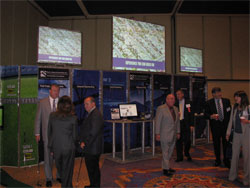Newmeyer Dillion Secures Victory For Crown Castle In Years-Long Litigation With City Council Of Piedmont Over Small Cell Wireless Telecommunications Sites
December 30, 2019 —
Newmeyer DillionNewmeyer Dillion, a prominent business and real estate law firm, is pleased to announce that, on November 18, 2019, the City Council of the City of Piedmont unanimously voted to approve the installation of 17 small cell wireless telecommunications sites by Newmeyer Dillion client Crown Castle NG West LLC, the leading provider of shared communications infrastructure in the United States. This victory ends a long-running legal dispute over Crown Castle's small cell wireless network, which was vehemently opposed by Piedmont residents and previously rejected by the City Council, prompting Newmeyer Dillion to bring a lawsuit against the city in 2017.
The dispute began in 2016 when Crown Castle filed an application with the City Council of the City of Piedmont to build nine small cell wireless sites designed to provide critical wireless telecommunications coverage in Piedmont. In October 2017, the Council denied the network, rejecting some of the proposed sites or approving others with onerous conditions.
Newmeyer Dillion's Government, Land Use and Environmental practice group filed a lawsuit on behalf of Crown Castle in the United States District Court for the Northern District of California in November 2017, challenging the Council's decision. Drawing from the language established in the Telecommunications Act of 1996, the lawsuit alleged that Piedmont's ordinances established an unreasonably high bar of approval, unlawfully prohibiting telecommunications services in the city.
The city quickly requested a court-supervised settlement, which was approved by the City Council in December 2018 and allowed Crown Castle to reapply to build 17 small cell wireless telecommunications facilities. The unanimous City Council approval came after extensive mediation work between the two parties.
"We are excited that our years-long efforts have culminated in this major win for Crown Castle, allowing them to build out critical telecommunications infrastructure in the City of Piedmont," said Michael Shonafelt, partner at Newmeyer Dillion. "With the growing national need for robust telecommunications networks that can handle voice communication and modern data demands, approvals such as this are significant, not just for the community the network serves, but for the viability of the national telecommunications network as a whole. Our team is proud to be using our multidisciplinary, business-oriented approach to successfully advise clients navigating these issues."
About Newmeyer Dillion
For 35 years, Newmeyer Dillion has delivered creative and outstanding legal solutions and trial results for a wide array of clients. With over 70 attorneys practicing in all aspects of corporate, privacy & data security, employment, real estate, construction, insurance law and trial work, Newmeyer Dillion delivers legal services tailored to meet each client's needs. Headquartered in Newport Beach, California, with offices in Walnut Creek, California and Las Vegas, Nevada, Newmeyer Dillion attorneys are recognized by The Best Lawyers in America©, and Super Lawyers as top tier and some of the best lawyers in California, and have been given Martindale-Hubbell Peer Review's AV Preeminent® highest rating. For additional information, call 949.854.7000 or visit www.newmeyerdillion.com.
Read the court decisionRead the full story...Reprinted courtesy of
BLOK, a Wired UK Hottest 100 Housing Market Startup, Gets Funding from a Renowned Group of Investors
October 11, 2017 —
Aarni Heiskanen - AEC BusinessBlok, listed as one of the Hottest 100 European Startups by Wired UK, has secured several renowned investors to promote the company’s product development and marketing in its second round of financing.
The Helsinki-based startup company aims to revolutionize the housing market through automation and artificial intelligence. Blok believes that the future of the housing market will be on the Internet, where intelligent technology is opening up new opportunities for disrupting traditional business models.
Read the court decisionRead the full story...Reprinted courtesy of
Aarni Heiskanen, AEC BusinessMr. Heiskanen may be contacted at
aarni@aepartners.fi
Connecticut Grapples With Failing Concrete Foundations
June 22, 2016 —
Nadine M. Post – Engineering News-RecordConnecticut’s commissioner of consumer protection, Jonathan A. Harris, expects to issue a report this fall on the “potential cause or causes” of failing concrete foundations in northeastern Connecticut. To date, the state Dept. of Consumer Protection has 225 complaints about foundation troubles from owners of single-family houses built between 1983 and 2003. But other building types also are affected, says William F. Neal, a professional engineer who, since 2010, has examined 300 buildings in 19 towns.
Read the court decisionRead the full story...Reprinted courtesy of
Nadine M. Post, Engineering News-RecordMs. Post may be contacted at
postn@enr.com
2011 West Coast Casualty Construction Defect Seminar – Recap
June 01, 2011 —
CDJ STAFF �  | �
�| Event exhibitors and sponsors contribute to an informative and engaging environment | �
�This year’s meeting was the best yet for the industry-leading construction defect and claims event.
�This year’s seminar concluded on May 13, 2011 with the Construction Defect Community Charitable Foundation Golf Tournament, held at Strawberry Farms Golf Course.
�The Disneyland Hotel in Anaheim, California was the place where more than 1,500 attendees convened for two days of professional development activities and seminars that included CLE workshops and panel discussions of special interest to legal and insurance professionals concerned with construction defect and claims litigation. Key events included “Challenges for Experts in Construction Defect Claims and Litigation,” “Keeping Up with Construction Defect Coverage,” and “Tips for Avoiding the ‘Perfect Storm’ in Handling of Wrap Claims.”
� �  | �
�| Supporting the golf tournament at the 15th hole | �
�This year’s Ollie award was given to George D. Calkins II, Esq. The West Coast Casualty Jerrold S. Oliver Award of Excellence was named in honor of the late Judge Jerrold S. Oliver, and recognizes an individual who is outstanding or has contributed to the betterment of the construction community.
�In addition to being the most comprehensive professional development seminar in the area of construction defects, this year’s seminar was equally valuable as a networking opportunity for members of the industry. People participated in professional development events during the day and then continued networking in the evening at numerous social events. The Lawn Party as well as the legendary Wood, Smith, Henning & Berman events were very well attended. Additional valuable networking events were hosted by a number of industry professionals at the House of Blues, and Tortilla Joe’s.
�As of this writing the 2011, West Coast Casualty's Construction Defect Seminar has applied for or has already received the following continuing education accreditation in the following areas;
�Read the full story…
�For more information about next year’s event, visit West Coast Casualty.
Read the court decisionRead the full story...Reprinted courtesy of
Warning! Danger Ahead for Public Entities
July 30, 2019 —
Michael J. Baker - Snell & Wilmer Under Construction BlogPublic entities are known to assert False Claims actions “to up the ante” to intimidate and aggressively address contractor construction claims. This strategy in the case of John Ross of Industrial Sheet Metal, Inc. (JRI) V. City of Los Angeles Department of Airports (LAWA), 29 Cal. App. 5th 378 (2018), backfired on the public entity, LAWA, in a big way and should serve as a warning to public entities about expanding claims to include False Claim actions. In this case, LAWA was awarded $1 in contract damages, its California False Claims Act (CFCA) claim was rejected by the jury as were JRI’s claims against LAWA. Despite losing on the substantive contract claims, the trial court found that JRI “prevailed in the action” under the relevant CFCA fee provision, Government Code 12652, subd. (g)(9)(B), regardless of JRI’s failure to prevail in the action as a whole. The California Appellate Court (hereinafter “Court”) affirmed the trial court’s finding.
The CFCA is analogous to the federal False Claims Act (FFCA; 31 U.S.C. 3729 et seq.). Since the CFCA is patterned on similar federal legislation, it was appropriate for the Court to look to precedent construing this similar federal act in interpreting the CFCA provisions. Accordingly, the Court looked at the False Claims Act cases for guidance in upholding the trial court’s decision in its determination that JRI was the “prevailing party” for determining an attorney’s fees award against LAWA.
Read the court decisionRead the full story...Reprinted courtesy of
Michael J. Baker, Snell & WilmerMr. Baker may be contacted at
mjbaker@swlaw.com
The Riskiest Housing Markets in the U.S.
June 26, 2014 —
Ben Steverman – BloombergThe real estate rollercoaster ride for U.S. homeowners isn't new. Some markets had even rockier rides in the early 1980s or '90s.
When so much wealth is tied up in one asset, the risk -- or stability -- of a local market can mean a lot to a homeowner. (See “The Hidden Risks in Your Housing Market” for more on this.)
Bloomberg.com asked real estate website Zillow.com to help us figure out which U.S. markets have been the riskiest over the last 35 years.
Our measure of risk: Assuming buyers held on to their homes for five years before selling, what was their chance of suffering a loss? As a secondary criterion, we compared the worst annual losses homeowners in these markets have experienced since 1979.
Read the court decisionRead the full story...Reprinted courtesy of
Ben Steverman, BloombergMr. Steverman may be contacted at
bsteverman@bloomberg.net
Ninth Circuit Rules Supreme Court’s Two-Part Test of Implied Certification under the False Claims Act Mandatory
May 13, 2019 —
Meredith Thielbahr - Gordon & Rees Construction Law BlogFor those contractors in the government arena, read on.
The False Claims Act (“FCA”) was enacted to deter knowingly fraudulent actions by contractors which resulted in a loss of property to the Government. Intent to defraud with resulting financial hardship was required. Contrary to popular misconception, the statute was not designed to punish all false submissions to the Government simply because those submissions, or claims, are later found to be false. The statute’s inclusion of the requisite element of knowledge is consistent with this notion:
- A defendant must submit a claim for payment to the Government;
- the claim must be false or fraudulent;
- the defendant must have known the claim was fraudulent when it was submitted (also known as scienter); and
- the claim must have caused the Government to pay out money.
See 31 U.S.C. § 3729(a).
Despite these explicit elements (in addition to common law elements of fraud), over the last two decades, contractors have seen ever-expanding theories of FCA recovery presented by qui tam plaintiffs and the Government. For example, under the FCA, the false “claim” evolved over time: the claim no longer needs to be an express false claim (i.e. the truthfulness of the claim is a direct condition of payment); the claim can be “implied” misrepresentation or “half-truth”.
Read the court decisionRead the full story...Reprinted courtesy of
Meredith Thielbahr, Gordon & Rees Scully MansukhaniMs. Thielbahr may be contacted at
mthielbahr@grsm.com
Chinese Billionaire Sues Local Governments Over Project Payment
January 28, 2015 —
Bloomberg NewsThe billionaire founder of closely held China Pacific Construction Group sued six local governments in a bid to force payment of 900 million yuan ($144 million) his company is owed for infrastructure projects.
Yan Jiehe said today he was trying to prove a point and winning the lawsuits wasn’t his main goal. Courts in Hebei, Yunnan, Guizhou, Hunan and Shandong provinces accepted the cases, he said in an interview.
“We cannot let the governments work without any supervision anymore,” Yan said. “The results of the lawsuits are not that important to me and I care more about rule of law.”
Read the court decisionRead the full story...Reprinted courtesy of
Bloomberg News




































































